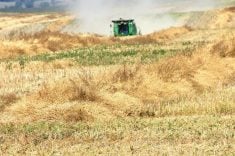MarketsFarm — ICE Futures canola contracts moved lower during the week ended Wednesday before uncovering some support, as the commodity remained stuck in a range after trending higher for most of the past year.
“Canola is caught in a rangebound, consolidation phase,” said MarketsFarm Pro analyst Mike Jubinville.
The relative stability in canola, he said, was contrasting with the sharp rise in Chicago Board of Trade soybeans and soyoil over the past two months.
Canola had shown considerable strength earlier in the marketing year on the back of Prairie drought concerns and the resulting small crop.
Read Also

U.S. grains: CBOT soybeans, corn, wheat fall in USDA data aftermath
Chicago grains took a dive on Friday, following a closely watched U.S. government crop report and the release of export data that could provide clues into Chinese buying.
“It feels like canola ran out in front of the other oilseeds, and now (the markets) are starting to rebalance themselves,” Jubinville said, noting canola crush margins — based off of the values for soyoil and soymeal — have finally moved back into the positive range after the headline numbers were negative for months.
While canola will eventually break out of its consolidation range, Jubinville said the eventual direction was unknown and “we’ll trade rangebound until further notice.”
However, given the tight canola supplies and nearby concerns over South American soybean production “the downside risk on canola seems relatively limited, until we get a better perception of next year’s North American production potential for canola and soybeans.”
While some areas of Western Canada have received much-needed snowfall during the winter, others remain on the dry side and Jubinville said the market could see some more upside potential if there are any hiccups in new-crop production.
Domestic crushers are covered for spot delivery, as evidenced by their softening spot basis levels. However, they still need coverage into the summer.
Demand is being rationed at current price levels, with exports running well behind the year-ago pace, but Jubinville said end-user buying will likely have to back away even more going forward.
— Phil Franz-Warkentin reports for MarketsFarm from Winnipeg.















